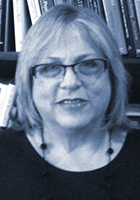What is embodied communication? How does our understanding of it facilitate therapeutic action? In this presentation, Caryn examines the effects of a form of embodied communication that she refers to as “embodied resonance.” Using a model of mind that is comprised of multiple self states, carried, unsymbolized, in body and mind, she suggests that embodied resonance enables patient and analyst to make contact with these dissociated states. Consequently, the analyst helps her patient understand, verbalize, and incorporate an expanded sense of self into his life story. A detailed clinical example illustrates how understanding the impact of a patient’s traumatic past allows him to come to terms with his particularly traumatic aging present. Changes in self-understanding are reflected in changes in the patient’s body and in his experience of himself as an aging person. Caryn illustrates that, whether implicitly known or explicitly verbalized, embodied resonance offers an enriching, mutative attachment experience. Finally, Caryn’s somatic attunement to her own traumatic memories and dissociated self states is discussed as a way to inform clinical impasses in analytic treatment.
 Caryn Sherman-Meyer, LCSW, presenter, is faculty, supervisor and training analyst at the National Institute for the Psychotherapies (NIP) in New York City. She is curriculum co-director in its Adult Training Program, founder and co-director of its License Qualifying Program in Psychoanalysis (LQP), and sits on the NIP Board of Directors. She is faculty and supervisor at the Institute for Expressive Analysis (IEA) in New York City. Caryn writes and presents on embodiment, eating disorders and bi-directional communication between patient and analyst. She is particularly interested in the reciprocal process of growth and change in the therapeutic relationship. Caryn supervises and practices individual, group and couples therapy in New York City.
Caryn Sherman-Meyer, LCSW, presenter, is faculty, supervisor and training analyst at the National Institute for the Psychotherapies (NIP) in New York City. She is curriculum co-director in its Adult Training Program, founder and co-director of its License Qualifying Program in Psychoanalysis (LQP), and sits on the NIP Board of Directors. She is faculty and supervisor at the Institute for Expressive Analysis (IEA) in New York City. Caryn writes and presents on embodiment, eating disorders and bi-directional communication between patient and analyst. She is particularly interested in the reciprocal process of growth and change in the therapeutic relationship. Caryn supervises and practices individual, group and couples therapy in New York City.
 Heather Ferguson, LCSW, discussant, is a psychoanalyst and group therapist in private practice in NYC. She is on the faculty at the Institute for Expressive Analysis and on the faculty and a Coordinating Committee Member of the Institute for the Psychoanalytic Study of Subjectivity (IPSS0, NYC. She teaches and writes about a range of topics related to eating disorder treatment, trauma and grief.
Heather Ferguson, LCSW, discussant, is a psychoanalyst and group therapist in private practice in NYC. She is on the faculty at the Institute for Expressive Analysis and on the faculty and a Coordinating Committee Member of the Institute for the Psychoanalytic Study of Subjectivity (IPSS0, NYC. She teaches and writes about a range of topics related to eating disorder treatment, trauma and grief.
CLICK HERE TO RESERVE YOUR SPACE
Event Location:
National Institute for the Psychotherapies (NIP)
250 WEST 57TH STREET #501
NEW YORK, NEW YORK
1.2 CE Contact Hours for NYS Social Workers.

